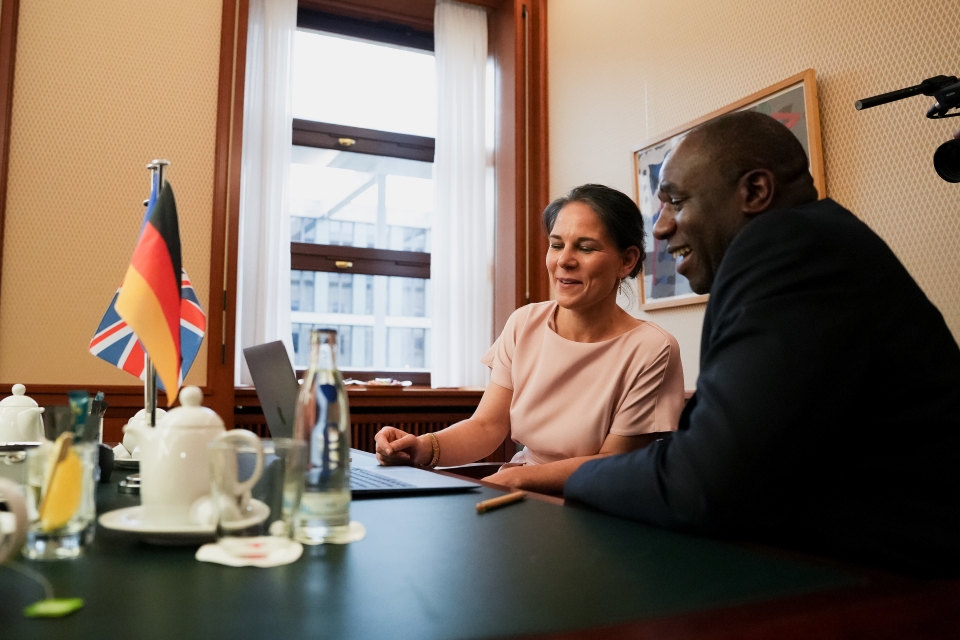It’s time to reset Britain’s relations with Europe: article by David Lammy
Writing in The Local Europe ahead of his trip to Germany, Poland and Sweden, the Foreign Secretary looks forward to Britain reconnecting with European neighbours.

I am a man of multiple identities. Londoner. English. Patriotic Brit. Proud of my Caribbean heritage. A transatlanticist. And, throughout my political career, absolutely committed to a close partnership with our European neighbours.
As the new British Foreign Secretary, with our Prime Minister Keir Starmer, this government will reset relations with Europe as a reliable partner, a dependable ally and a good neighbour.
That is why I am travelling immediately to some of our key European partners. Sitting down with Annalena Baerbock, Radek Sikorski and Tobias Billström, my message will be simple: let us seize the opportunity for a reset, working even more closely together to tackle shared challenges.
The most immediate of these challenges, of course, is Ukraine. We will stand by the brave people of Ukraine, as they defend their freedom against Vladimir Putin’s new form of fascism. British military, economic, political and diplomatic support for Ukraine will remain ironclad.
But we are always stronger when we work with others. Germany, Poland and Sweden are all also staunch supporters of Ukraine. European security will be this government’s foreign and defence priority.
Russia’s barbaric invasion has made clear the need for us to do more to strengthen our own defences. Next week, the Prime Minister, the Defence Secretary and I will all travel to Washington for the NATO Summit.
Seventy five years ago, my political hero and former Labour Foreign Secretary, Ernest Bevin, was pivotal to forming the Alliance. He would have been delighted to see NATO grow larger over the years, with Germany, Poland and now Sweden all joining the most successful defensive alliance in history.
This government’s commitment to the Alliance is unshakeable, just as it was in Bevin’s time. I will be discussing this weekend how NATO allies can go further in investing in our tightly connected defence industries and providing Ukraine with its own clear path to joining our alliance.
Alongside security, we want to do more together to bring prosperity to our continent. None of us can address the urgency of the climate emergency alone – we need coordinated global action. This is particularly important in Europe, whose energy networks are so closely connected – together, we must invest in the industries of the future and deliver sustained economic growth for all.
And finally, we must do more to champion the ties between our people and our culture. Holidays, family ties, school and student exchanges, the arts, and sport (I will of course be cheering on England in the Euros…). Thanks to this, our citizens benefit from the rich diversity of our continent.
We can deliver more cooperation in many areas bilaterally, via NATO and in groupings like the G7, the Joint Expeditionary Force or the European Political Community who will gather at Blenheim Palace on 18 July.
But if we are to fulfil our ambitions for a reset, we must also improve Britain’s relationship with the European Union. I will be explaining to my new fellow foreign ministers how our new government’s proposal for an ambitious and broad-ranging UK-EU Security Pact would underpin closer cooperation between us, enshrining a new geopolitical partnership. I also look forward to hearing their ideas for how we can rebuild trust and reset the relationship between the UK and the EU.
Over centuries, our individual and national stories have come together to tell a wider story of shared progress. Today, we all share a commitment to democracy, human rights and international law. Tragic experiences in our continent’s shared past have helped us to understand how our shared security and prosperity depend on these shared values.
And I believe these values also offer a foundation for closer partnership in the future. My visit this weekend is just the beginning. I look forward to seeing Britain reconnect with our European neighbours in the years ahead.
This article was first published in The Local Europe on 7 July 2024.